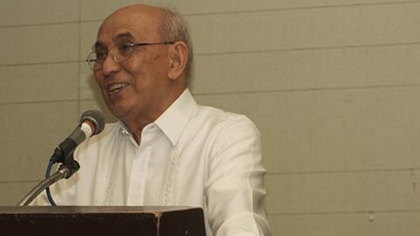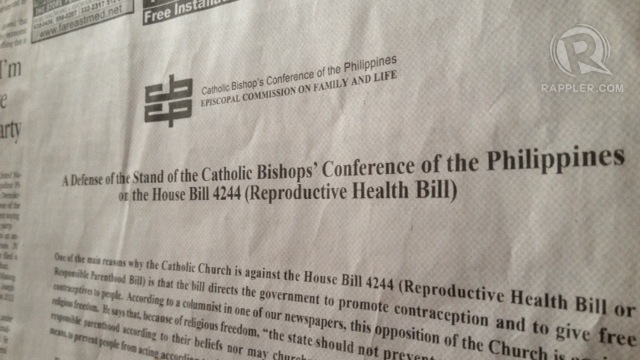SUMMARY
This is AI generated summarization, which may have errors. For context, always refer to the full article.

MANILA, Philippines – The Catholic Bishops’ Conference of the Philippines (CBCP) published a newspaper advertisement on Friday, August 31, to debunk the claims of Jesuit constitutionalist Fr Joaquin Bernas on the Reproductive Health (RH) bill.
The CBCP did not name its fellow clergyman in the organization’s statement published in the Philippine Daily Inquirer, the top newspaper that carries Bernas’ regular column. It only referred to “a columnist in one of our newspapers,” then cited direct quotes from Bernas, who is also dean emeritus of the Ateneo de Manila Law School.
In a column published August 6, Bernas emphasized his stance on the RH bill, which includes points on freedom of religion in a pluralist society. The priest did not explicitly support the controversial measure that is now in crunch time at the House of Representatives.
Bernas, in fact, began his column by saying he adheres to Catholic teaching against contraceptives – only that he respects the freedom of others to believe otherwise.
In the paid ad signed by Antipolo Bishop Gabriel Reyes, chair of the CBCP Episcopal Commission on Family and Life, he labeled the CBCP statement a “defense.”
Not ‘against’ freedom
Reyes referred to Bernas’ supposed claim that the Church’s opposition to the RH bill “is against religious freedom.”

The constitutionalist, however, did not make such a categorical statement. What Bernas said, which Reyes also quoted, is a general tenet: “The state should not prevent people from practicing responsible parenthood according to their religious belief, nor may churchmen pressure President Aquino, by whatever means, to prevent people from acting according to their religious belief.”
Nevertheless, Reyes defended the CBCP’s stance by saying the Church is not moving to ban contraceptives – the non-abortifacient ones, according to him – in opposing the RH bill. The Church will be “happy,” however, if the government bans these.
Anyone, after all, “can buy contraceptives from drugstores and even from some ‘convenience stores,’” he noted. “What the Church is against, I repeat, is that government should promote contraception and provide free contraceptives to people,” Reyes said.
“Therefore it is wrong to say that the Church wants the government to ‘prevent people from practicing responsible parenthood according to their religious belief’ and that the Catholic churchmen are compelling ‘President Aquino, by whatever means, to prevent people from acting according to their religious beliefs,’” he explained.
This is a claim challenged by RH bill advocates, however. Those who support the bill claim that without funding, the government is practically preventing the poor from using contraceptives.
“We are at this level of poverty wherein we still have a few million people living at that level, they cannot pay for their own contraceptives, unfortunately,” Sen Pia Cayetano explained in an interview on Rappler’s Talk Thursday. (Watch more in the video below.)
Based on ‘natural law’
Reyes also pointed out that the Church’s opposition is not purely about religious beliefs. It is based on principles applicable to all, he said.
He said Catholic teaching on contraceptives “is based on natural law” – an expression of moral law, based on the Catechism of the Catholic Church, that is “universal” and appeals to “common principles.” According to the Catechism of the Catholic Church, natural law “expresses the dignity of the person and determines the basis for his fundamental rights and duties.”
Based on our own research, the principle of natural law that supposedly covers the RH bill is found in the papal document Humanae Vitae by the late Pope Paul VI in 1968. Interpreting natural law with regard to sexual intercourse, Paul VI said sex should not only unite man and wife, but also by “necessity” remain open to procreation of life.
Wrote Paul VI: “The reason is that the fundamental nature of the marriage act, while uniting husband and wife in the closest intimacy, also renders them capable of generating new life – and this as a result of laws written into the actual nature of man and of woman. And if each of these essential qualities, the unitive and the procreative, is preserved, the use of marriage fully retains its sense of true mutual love and its ordination to the supreme responsibility of parenthood to which man is called.”
In the paid ad, Reyes explained this teaching was written “through correct reasoning (on) the nature of the human person.”
“All human beings, Catholic or not, are obliged to act according to right reason. By the efforts of the Church to go against the RH bill, the Church is not imposing her beliefs on others. She is trying to stop a bill which is against natural law, a law which all human beings, Catholic or not, should follow,” Reyes said.
Pluralist but…
Reyes also pointed out that there is a “limit” to pluralism in society.
“We cannot accept an ‘ethical pluralism which ignores the principles of natural ethics and (yields) to ephemeral cultural and moral trends, as if every outlook on life were of equal value,’” Reyes said, citing the Doctrinal Note on the Participation of Catholics in Political Life by then Joseph Cardinal Ratzinger and now Pope Benedict XVI.
The bishop also took exception to Bernas’ statement that government leaders should “interpret the common good of their country not only according to the guidelines of the majority but also according to the effective good of all the members of the community, including the minority.”
Reyes reiterated that the Church’s opposition to the RH bill appeals to natural law, “which is valid for all, the minority as well as the majority.”
He noted that in other countries, like Europe and the United States, “contraception was first to be allowed, then abortion, then euthanasia, then divorce, then same sex marriage.” “Let us not allow this to happen here in our own country,” Reyes said.
The RH bill has been a contentious issue within the Catholic Church itself. Some priests, who are bound by Church law to follow their bishops, have subtly expressed support for the bill. The Catholic laity has been more outspoken in backing the measure. (Watch more in the video below.)
Some 192 professors from the Jesuit-run Ateneo de Manila University, for example, have issued a statement supporting the RH bill but clarified it is not their university’s stance. Ateneo president Fr Jose Ramon Villarin has expressed support for Catholic bishops on the issue but said he respects the pro-RH bill professors’ academic freedom.
The head of the CBCP, Cebu Archbishop Jose Palma, said Catholic school professors “should not teach anything contrary to the official teaching of the Church.” But a top official of the Philippines’ biggest association of Catholic schools called for respect for academic freedom. – Rappler.com
For more updates on the issue of the RH Bill, view our #RHBill Debate Microsite.
Read on for other views on the RH Bill debate:
| Yes to RH Bill | No to RH Bill |
More in #RHBill Debate:
- The 7 Deadly Sins of the RH bill, according to Sotto
- CONVERSATIONS: Are you for or against the #RHbill?
- Nobel Prize winner contradicts CBCP
- Fact Sheet: House Bill 4244 on Reproductive Health
- UN weighs in on RH Bill
- WHO on RH bill: No politics, just facts
- RH bill backers hit bishops’ ‘science’
- Catholics clash over controversial RH bill
- Poverty, scarcity and the rule of the Catholic Church
Add a comment
How does this make you feel?
There are no comments yet. Add your comment to start the conversation.